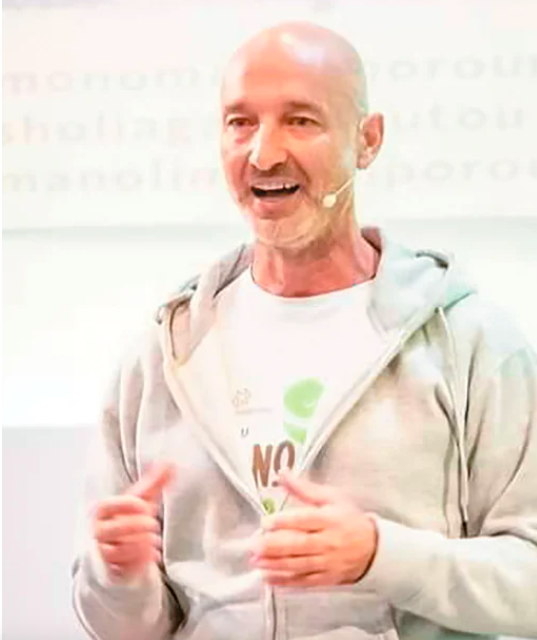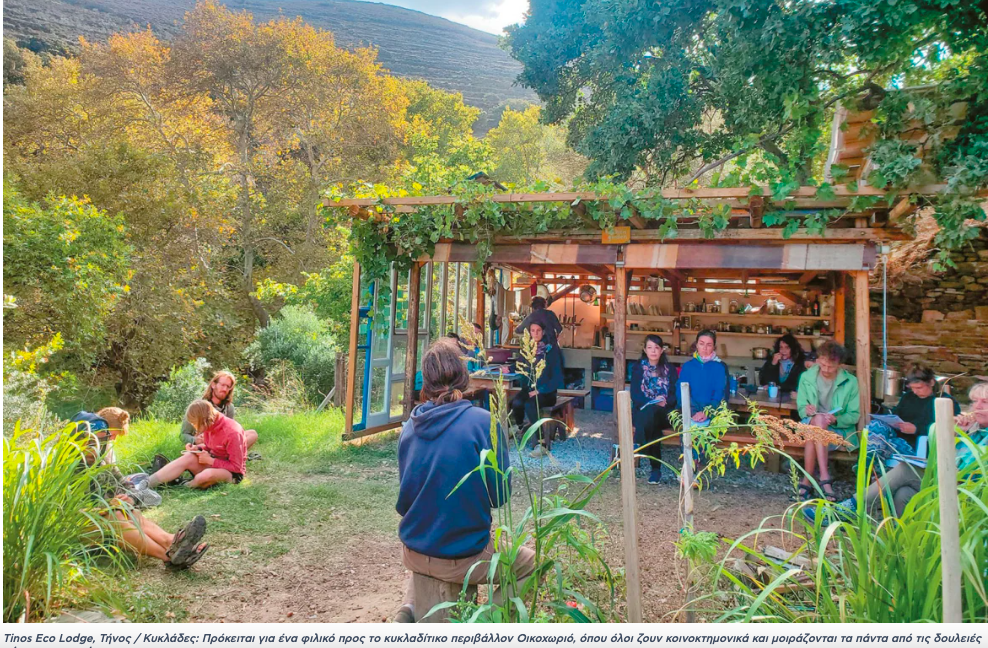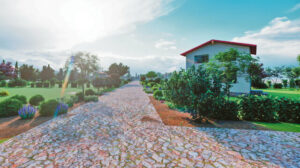“Oikoxoria,” (Ecovillage), “Agapokoinotites” (Love Community) and various other terms denote the contemporary trend of returning to nature, as it has been expressed in Greece in recent years. These terms essentially signal the various collective initiatives that have been developed or are being developed on Greek soil, which are governed by an ecological spirit, as well as a broader framework of social organization that refers to forms of direct democracy.
This is not a new phenomenon, as it has been encountered for at least three decades in both Europe and other parts of the world. However, in recent years, it has gained particular intensity due to the suffocating living conditions in modern metropolises, the increasingly difficult struggle for professional and job security, and survival itself, as well as the harsh daily life in all its aspects and manifestations.
Nature has always been the dominant refuge, offering valuable breaths of tranquility. Therefore, more and more city dwellers are choosing to escape to it whenever their obligations allow.
However, some have decided to view the meaning of life from a completely different perspective. They have chosen to distance themselves from the bustling urban environment and organize their lives within nature with what it can provide. Far from the inevitable constraints of the relentless modern daily life, they have chosen what they consider to be “few and good” which, they believe, is sufficient to achieve happiness. Simplicity, self-sufficiency, and respect for nature and its rules are some of the fundamental elements of these communities.

Undoubtedly, detaching today’s person from the numerous obligations—economic, social, familial, and even technological—is a challenging endeavor on its own. However, there are those around us who have succeeded or are striving to succeed in this.
Although all these may seem to some as “romantic” or “a return to the past,” there is also the opposing view: that the goal of these movements is a return to the future, given that the challenge of sustainability and the circular economy is becoming a necessity due to the climate crisis, even if not everyone needs to… take to the mountains.
However, all these initiatives face various problems, with the foremost being economic sustainability, as well as several bureaucratic entanglements.
The first such community established in Greece was the ecological village Skala, which, according to information, has suspended its operation for some years now. It was located about 50 km from Thessaloniki, near Zagliveri, on the edge of an oak forest. The farm was purchased in 1998 to create an ecological village, and in 2004, the first building was constructed. However, it took several years before it took on a more stable form. This happened in 2012 when the first two families decided to permanently reside there. Subsequently, seven adults and four children lived in Oikoxoria Skala in two small houses and two caravans. In addition to these, the residents used a third core house where they cooked in a common kitchen and usually ate together. All constructions were made with environmentally friendly materials and had minimal energy needs.

The Oikoxoria, with a total area of 60 acres, was energy-independent as it was powered by photovoltaic panels, and used potable water from springs and rainwater for irrigation. The residents cultivated various products, such as apples, strawberries, quinces, apricots, peaches, and vegetables, while other food was supplied by local producers. The Oikoxoria was a member of the Global Eco-Village Network and hosted dozens of volunteers from around the world during its operation.
The Agapokoinotita (Love Community)
“A new proposal for life outside the usual.” This is how the project for the Oikoxoria Agapokoinotita is introduced by its founder, Argyrios Moutsiopoulos, who, along with his wife Irini Tsiridou and their two children, are the first potential residents. They are also the owners of the 13-acre plot where Agapokoinotita will be developed, and they currently reside in the village of Mendenitsa in Phthiotis.

Speaking to “THEMA,” he states that the project is ready and is being communicated to those interested in becoming permanent residents while emphasizing that everything is based on paperwork, agreements, and the necessary legal safeguards for the community members. There are also studies for meeting energy needs through renewable energy sources.
The Agapokoinotita, operating as an association, will include 14 small houses for 14 families or individual persons, with two dimensions: 35 sq. meters for two adults with or without children and 45 sq. meters for 3-4 adults (with or without children). However, according to Mr. Moutsiopoulos, there is a delay due to broader conditions. Specifically, two years ago, potential residents for the 14 houses had been gathered, but due to the geopolitical and energy crisis, there was a significant increase in construction and participation costs. Thus, the matter was frozen until about three months ago when it began to mobilize again.
Argyrios Moutsiopoulos
“With today’s prices, the total cost for the Oikoxoria is estimated at 1.5-1.7 million euros, and the project will proceed in two phases. The first phase will involve the construction of the community members’ houses and a common building of 80 sq. meters, while the second phase will cover the remaining buildings,” explains Mr. Moutsiopoulos.

Regarding the completion and operation timeline, there is currently nothing specific, as although there are more than 300 interested parties, the number of 14 residents or families needed to move to the next step has not yet been reached. The biggest problem in this regard is the financial one, as each resident or family must pay 50,000 euros to obtain their house. Construction will only begin when the final number of residents for all 14 houses is reached.
The Location and Principles
The Agapokoinotita will be established near the village of Mendenitsa, on Mount Kallidromo (at 500 meters elevation), on 10 acres where the houses and infrastructure will be developed, and on another 3 acres where cultivation will take place.
According to the written principles of the community, “We are creating a Model Oikoxoria (Eco Village), where all beings will live in harmony. With innate respect for Mother Earth, near healing springs, in nature.”
The basic principles of the community include one that stipulates that its members will live in “timeless eternity,” meaning that clocks, calendars, mobile phones, and computers will be kept in a specific enclosed area. There will be internet and laptops available, and anyone who wants can use phones and the internet for communication. There will be no televisions. The houses, which will meet their energy needs with photovoltaic panels, will have a light switch but no electrical outlets. Additionally, members will wake up with the sunrise and rest with the sunset. The diet will be vegetarian, without animal products, oriented towards Hippocratic Nutrition, without unnecessary overconsumption, and with absolute respect for the actual nutritional needs of the body.

Also, pets and domestic animals are not allowed in the community, and all permanent residents and visitors during their stay will abstain completely from all addictive substances (alcohol, cigarettes, tobacco, vaping, and any type of drugs) in all indoor and outdoor spaces. Children are expected to attend school in the village of Molos, 10 km away, and there will be a small bus for their transportation.
It is noted that “it is a community that has been architecturally designed with sacred geometry and permaculture elements.” Additionally, all buildings will have passive systems for energy conservation and will be designated as tourist accommodations with an EOT (Greek National Tourism Organization) sign. The Agapokoinotita will be open to the public (except for certain days of the month). It will generate revenue from visitor traffic (primarily from guesthouses), from the physical store, the e-shop, and the restaurant. There will be a fund from the association through which the expenses for the food of the permanent residents and the maintenance of the buildings will be covered.
The Nesson Ecovillage
Another ambitious project is the Nesson Ecovillage, which is also in the development phase but has its roots in earlier initiatives. It is located in the village of Nessonas in Thessaly, near the city of Larissa, and the plan involves developing the Ecovillage on a 15-acre plot, while another 16 acres cover the aeiphoria farm, a farm producing products based on regenerative agriculture.
The initial group mobilized in 1999 and has since evolved into a social cooperative engaged in natural building, sustainable cultivation, and sustainable technologies in general. “The estate in Nessonas Larissa, which serves as a testing ground for the aforementioned technologies, is cultivated using permaculture and regenerative agriculture methods and constitutes a complete ecosystem with food forest, annual crops, and a comprehensive water and energy management system,” it is stated.
Christos Kontomanos, one of the key contributors to the project, mentions that there are already about 12 people in the community, and initially, 10 houses with natural building methods will be constructed. Additionally, by the end of the year, it is estimated that the necessary permits will be issued to start their construction. As he explains, the community will rely on mutual complementarity, and its members will contribute primarily with their labor and skills, while there will be a common fund.
The group already living and working there has recently taken over the village café and plans to convert parts of the school into a cultural center. The community manages the farm based on
Ask me anything
Explore related questions





